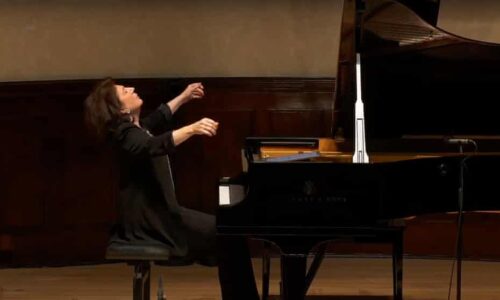 United Kingdom Schubert, Ravel, and Liszt: Imogen Cooper (piano). Wigmore Hall, London, 28.11.2021. (MB)
United Kingdom Schubert, Ravel, and Liszt: Imogen Cooper (piano). Wigmore Hall, London, 28.11.2021. (MB)

Schubert – Piano Sonata No.16 in A minor D845
Ravel – Sonatine
Liszt – Années de pèlerinage: Troisieme année S163, ‘Les jeux d’eaux à la Villa d’Este’
Ravel – Jeux d’eaux; Valses nobles et sentimentales
Liszt – Hungarian Rhapsody No.13 in A minor S244
A concert of two halves, this. Imogen Cooper’s severely insistent account of Schubert’s A minor Sonata, D 845, contrasted strongly with more colourful, yielding Ravel and Liszt. That, you might say, would be as expected, and you would have a point. I nevertheless longed for a little more in the way of chiaroscuro in Cooper’s Schubert, whilst acknowledging this may have been as much a matter of taste as anything else. Rhythm and, perhaps to a lesser extent, motivic working were to the fore in an angry first movement, whose uneasily wandering development section intrigued and did anything but console. There was greater ambiguity to the Andante con moto theme and variations, which again wandered in alienated, darkly Romantic fashion. An estranged lilt hilted at something else, but it was only a hint. Mercurial insistence in the scherzo led to still bleaker unease in its trio, whose ultimate note seemed to be of exhaustion. One would hardly expect the closing rondo to comfort. It certainly did not, though there were a few more ambiguous passages again. Ultimately, however, this was a bleak conclusion to a bleak reading.
There was no question of playing Ravel as if it were Schubert (however understood). The Sonatine benefited from lighter touch and mood, and greater flexibility. There seemed to me, right from the start, to be greater awareness or at least communication of harmonic rhythm, and Gallic charm too, however clichéd the phrase. All three movements, albeit with different contours, character, and pulse, glistened from within. A liquid — aptly enough — account of Jeux d’eaux had backbone too, in a performance that was clearly deeply considered, whilst remaining quite free of pedantry. Valses nobles et sentimentales showed greater kinship, through its waltz rhythms, with Schubert. This was unashamedly big-boned Ravel, but none the worse for it; until it yielded, that is. For the second waltz proved more languorous and flexible; the delectable pain of the third was well-judged; and so on, through magical rubato and keen awareness of what had passes, musically and perhaps extra-musically too. There was a ghostly suavity to the ‘Epilogue’.
After the Sonatine, we heard the first of two pieces by Liszt: ‘Les jeux d’eaux à la Villa d’Este’. Its muscular virtuosity also offered glistening results, very much here in the heat of the midday sun. It was forthright, yes, but it sang, in a performance of fine musical integrity. The A minor Hungarian Rhapsody is, well, rhapsodic — and sounded as such. Fervent Lisztian I may be, but I should quite happily never hear the Hungarian Rhapsodies again. They have their fans, though, and in her closing number, Cooper did not shy away from giving a grandly rhetorical performance, imbued with a rubato that evoked both temporal robbery and another, diabolical form of bargaining.
Mark Berry
